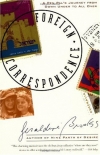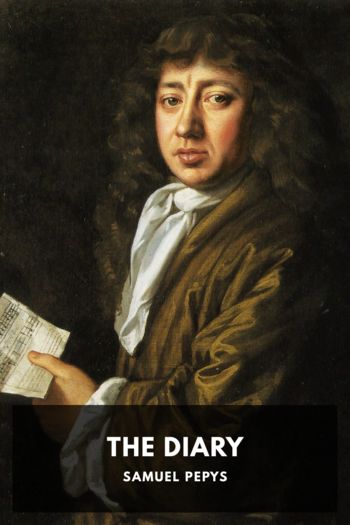Foreign Correspondence: A Pen Pal's Journey by Geraldine Brooks (finding audrey .TXT) 📗

- Author: Geraldine Brooks
Book online «Foreign Correspondence: A Pen Pal's Journey by Geraldine Brooks (finding audrey .TXT) 📗». Author Geraldine Brooks
In a city where even the governor’s residence had been built facing the wrong way—its big windows orient south, waiting in vain to catch the light of a sun that in our hemisphere moves through the northern sky—it was no wonder that our Bland Street terrace house was a misplaced piece of Victorian England. For the five years after I was born, my parents worked on the house until they finally had it in shape to sell. With the profit, we moved a few miles farther west to a neighborhood named Concord, into a smaller, newer, cookie-cutter cottage designed at the time Australia’s states achieved federation in 1901. A cool, tiled porch shaded the front door, which opened on a central hallway. Inside, the hall divided four rooms two by two and then emptied into a dining room and kitchen running lengthways across the back. An enclosed veranda had been added beyond.
It was another bland street of liver-brick bungalows, identically designed, marching in lockstep away from the grand homes that lined the harbor. As the neighborhoods spread west, they gradually became less affluent, ending with the newer, flimsier fibro houses going up on the distant plain. The farther west, the hotter the summers, the fewer the trees and the longer the journey back to the harbor and wide scalloped beaches.
In the fine distinctions of Sydney social geography, Concord was “inner west,” denied ocean breezes or harbor views, yet not without patches of period charm. Our house was a bargain because it was “in the road”—slated for eventual destruction for a planned western expressway. But the city planners hadn’t figured on my mother, a tireless lobbyist. Her decade of campaigning would eventually help to get the highway rerouted and net the windfall that would allow my parents to move to the beautiful northern beaches.
For my mother, the Concord house was a dream. Sunlit and impeccably maintained, its lack of stairs, its clean dry plaster and its pale green wall-to-wall carpet signaled the end of the endless drudgery imposed by the Bland Street terrace. The garden, too, was orderly: no rampant lantana or morning-glory vines. Just clipped privet hedges and an expanse of crew-cut buffalo grass, with severely pruned orange, mandarin and apricot trees lining the gray wood fences.
But there was more to this move than two people looking for fewer chores. I think that something in the house’s tidy, foursquare proportions spoke to a wish that both my parents shared: a wish for a simpler, more stable life than either of them had known.
As a Depression child, my mother Gloria had lived through her parents’ loss of their house and the necessary migrations that followed, from one temporary lodging to another. Her own glamorous, relentlessly social mother had never been at home much, wherever they were living. Throughout her childhood, Gloria’s dream had been to have a mother who stayed in the same chair in a familiar room, busy with her knitting. The Concord house looked to her like a fine place to knit.
• • •
It’s less easy to say how it looked to my father.
Lawrie Brooks was an Australian by accident. Born in California in 1907, he’d been twenty years old when he saw Al Jolson in the legendary first talkie, The Jazz Singer. Lawrie had a beautiful clear tenor voice, so while he worked in a steel mill he took singing lessons. With the help of vocal scholarships, good looks and good luck, he made his way into the white-tie world of the big bands. He sang at the grand hotels—the St. Francis, the Biltmore and the Royal Hawaiian—with the bands of Johnny Noble, Harry Owens, Hal Grayson, Jimmie Grier and Jay Whidden. In Hollywood, he appeared on the same bill as Eddie Cantor, Burns and Allen and the Downey Sisters. He sang for the Academy Awards at the Biltmore Bowl.
In 1938 he set off with the Whidden band for a season in Australia. When the band’s engagements in the cities ended, my father decided to stay on with another band, to take a look at the Outback. But flash floods turned the tour into a disaster. The stress, on top of the long, hard-drinking nights on the road, put Lawrie briefly in hospital with a stomach ailment. While he was there, the band leader absconded with his pay. Lawrie was stranded, without the fare to get back to the United States.
While trying to earn his passage home, he developed a taste for Australia’s strong beer, dull cricket and intense, male-bonding mateship. So firm were the friendships that when his Aussie musician mates joined up in the Australian Infantry Forces the day that France fell to the Nazis, he decided to enlist with them, rather than with the U. S. Army. They formed an entertainment unit and toured the front lines in the Middle East and the Pacific. Corporal Brooks spent his war singing in Egyptian sandstorms and slowly sinking thigh-deep into New Guinea jungle mud.
Back in Sydney in the postwar years before the arrival of television, radio was Australia’s glamor industry and Lawrie became one of its stars. He soon met Gloria Van Boss, a radio-station publicist with a deft touch for getting celebrities on the front page of the daily papers.
Lawrie Brooks proposed to Gloria Van Boss on a Sydney tram in 1946. Before she gave her answer, he insisted on telling her the story of his life. As the tram rattled along, he unfolded a tale of almost forty hard-lived years.
It was a story she kept to herself. My father’s past remained a mystery to me, revealed gradually, and only in accidental fragments.
“Daddy, who’s this?” It is a still, sleepy Sunday afternoon in 1962. Darleen is out; my mother is napping. Looking for something to do, I have followed my father to the back veranda, where he is trying to organize a closetful of paperwork.
Most of the pictures in our family album are black and white. So the colored snapshot that slides from





Comments (0)